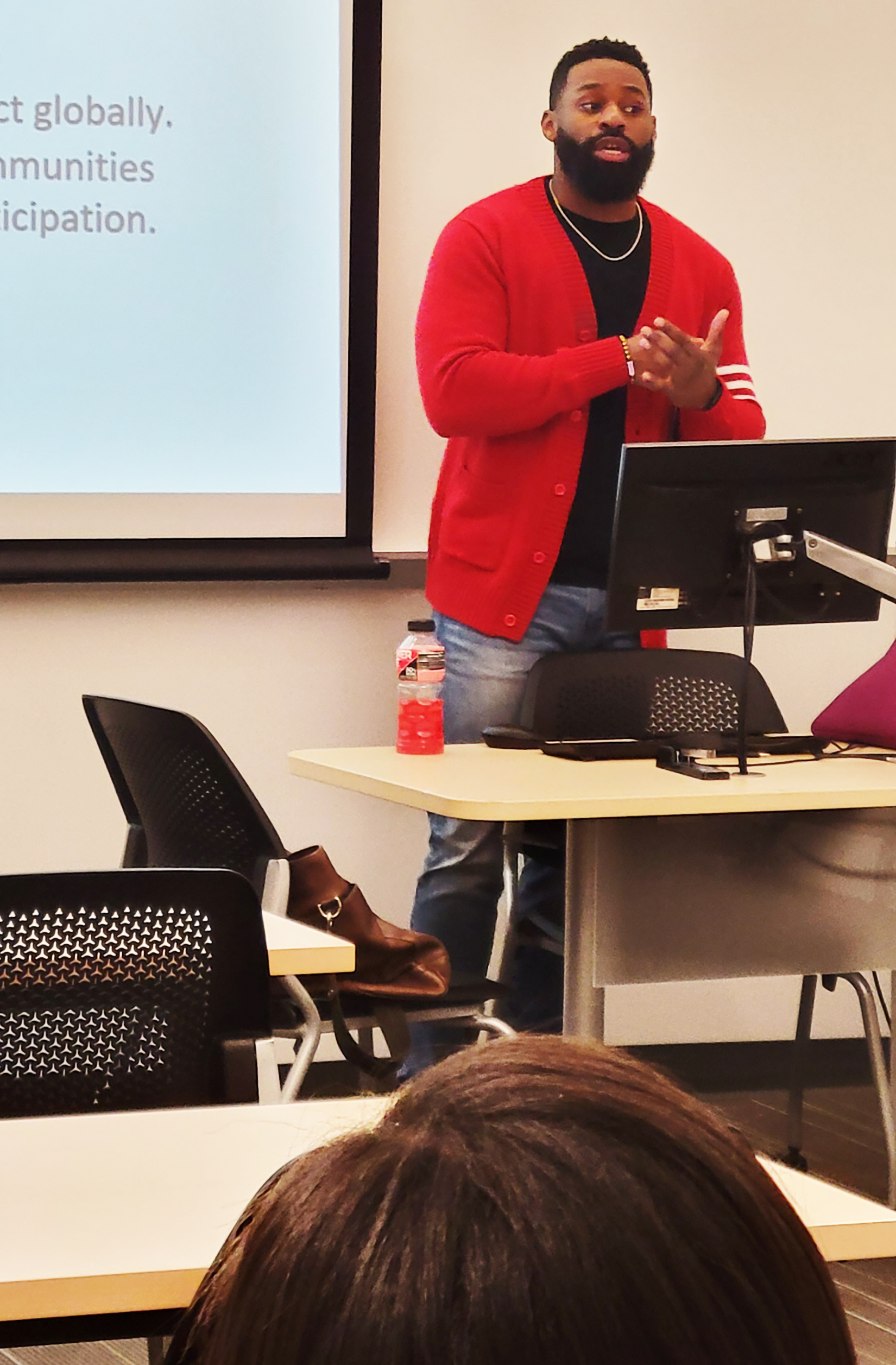
By Nina Payne
Trinity Times Correspondent
When Eric J. Thomas came to speak with students at Trinity Washington University, his role as a mental health professional in D.C. was on display as he urged members of the class to be social justice activists employing positive human behavior solutions in their mission.
In Thomas’s May 9, 2024, talk with the students in a “Media and Social Change” course offered in Trinity’s Journalism and Media Studies program, he used the example of nonviolent resistance of the civil rights era as a model for healthy social justice advocacy.
“When people are now fighting for new types of rights for movements, they are always using the Civil Rights Movement as a precedent to fight for other marginalized and oppressed groups,” he told the class.
Thomas implored the students to think about what can be learned from the Civil Rights Movement when conducting affective advocacy today.
He was invited to speak at the Trinity campus by Neosho Ponder, the professor teaching the “Media and Social Change” course, which examines major social justice movements in the 20th century.
The civil rights era – which began in the late 1940s and ended in the late 1960s – is a shining example of how to achieve social change, Thomas said, noting that it served as a guide for several movements that came after.
Martin Luther King Jr. and other leaders of the Civil Rights Movement employed nonviolent resistance and nonviolent civil disobedience for the causes of racial equality, the right to vote, desegregation, labor rights, poverty and ending the Vietnam War.
The Civil Rights Movement resulted in the landmark 1954 U.S. Supreme Court decision Brown v. Board of Education that effectively ended racial segregation in public schools; passage of the Civil Rights Act of 1964 preventing employment discrimination due to race, color, sex, religion or national origin; the Voting Rights Act of 1964 to prevent the use of literacy tests as a voting requirement; and the Fair Housing Act, also known as the Civil Rights Act of 1968.
Thomas – who runs Connecting Humanity and specializes in empowerment through DEI, climate and cultural development – has a background in business administration and education, while also having a master’s degree in social work from Howard University.
His activism focuses on leadership, education, building relationships, sharing ideas, and uplifting his community.

“Eric is a mental health professional and a motivational speaker for young professionals,” Ponder told Trinity Times. “He hosts a podcast (Think Tank) where he discusses social change, and the impact media has on Black mental health.”
She wanted Thomas to speak with the students in her class because he is a dynamic preacher and minister to young adults at Reid Temple AME Church in Glenn Dale, Maryland, who can bridge the gap between the civil rights era generation and the millennials and Generation Z.
“He understands the connection between media and social justice from a 21st century perspective,” Ponder said.
In his presentation Thomas discussed how the influences of the Civil Rights Movement continue to be present in the social justice agendas of today, how the media plays a role in these causes, and why it is important for students to understand this.
There is inspiration from the Civil Rights Movement worldwide with present day social justice initiatives fighting for global equality and equity, he said.
“Seeing how Eric Thomas uses his advocacy through social work and storytelling was inspiring,” said Rosalyn Johnson, a criminal justice major at Trinity who called the presentation extremely informative. “It was important for us to see.”
Attending the Thomas presentation provided Johnson with greater knowledge of social justice movements and allowed her to see advocacy in a different light.
Ponder said she was pleased that Thomas “could connect well with the students and engage in a robust dialogue about the impact of media during civil rights and current social justice movements.”
As a Trinity student who missed out on experiencing Mr Thomas’s discussion and who would like to do the same things he is doing by being a mental health advocate for the community is interested in connecting with Me Thomas. Hopefully Trinity can bring him back on a larger scale for everyone to experience and provide his contact information in case of we would like to see how we can help and SUPPORT him in HIS mission. I personally would love to meet and discuss this opportunity with him one on one. Thank you for sharing this information regarding a rare gem in our community. Thank you Mr Thomas for all that you do!!
Hey people!!!!!
Good mood and good luck to everyone!!!!!